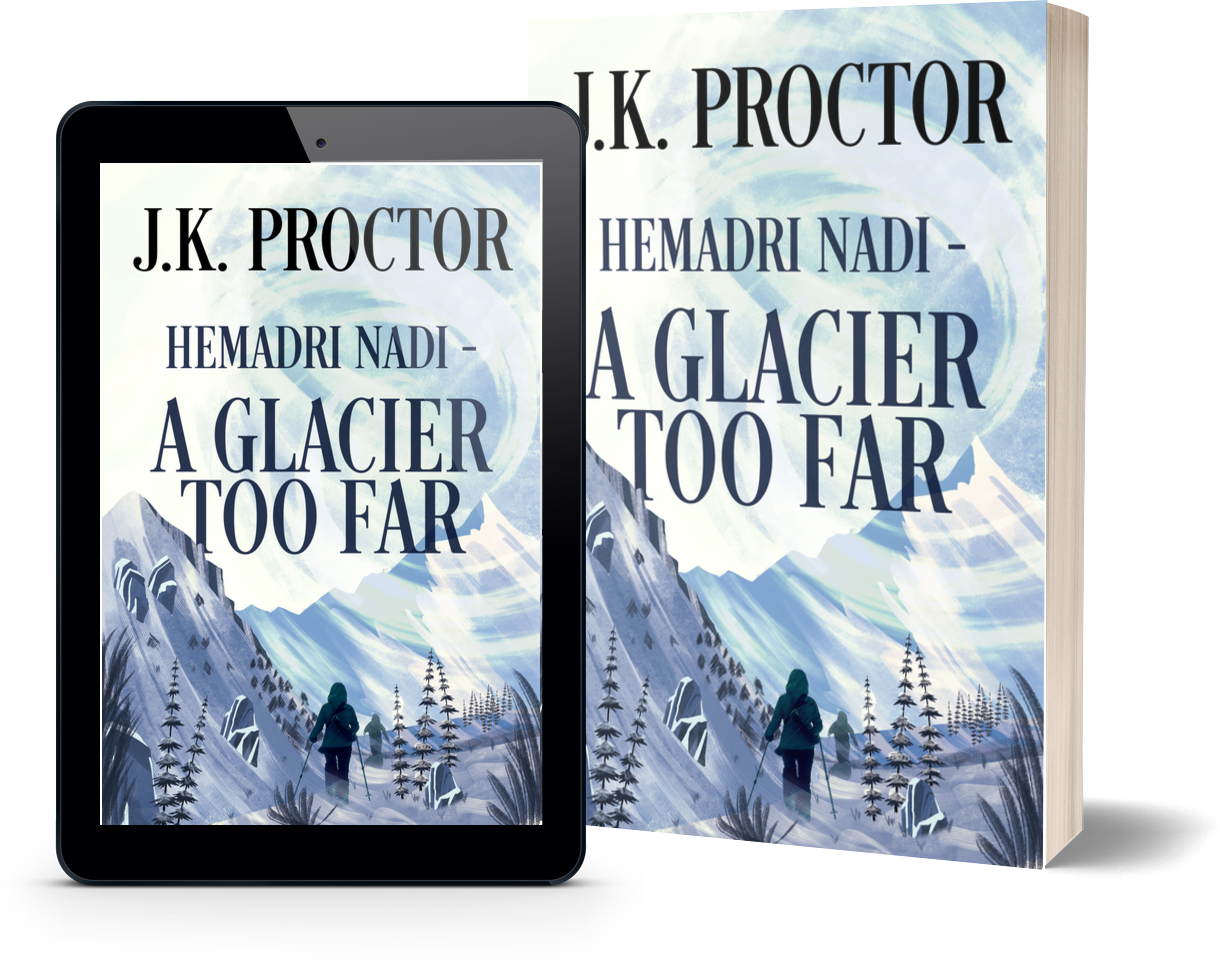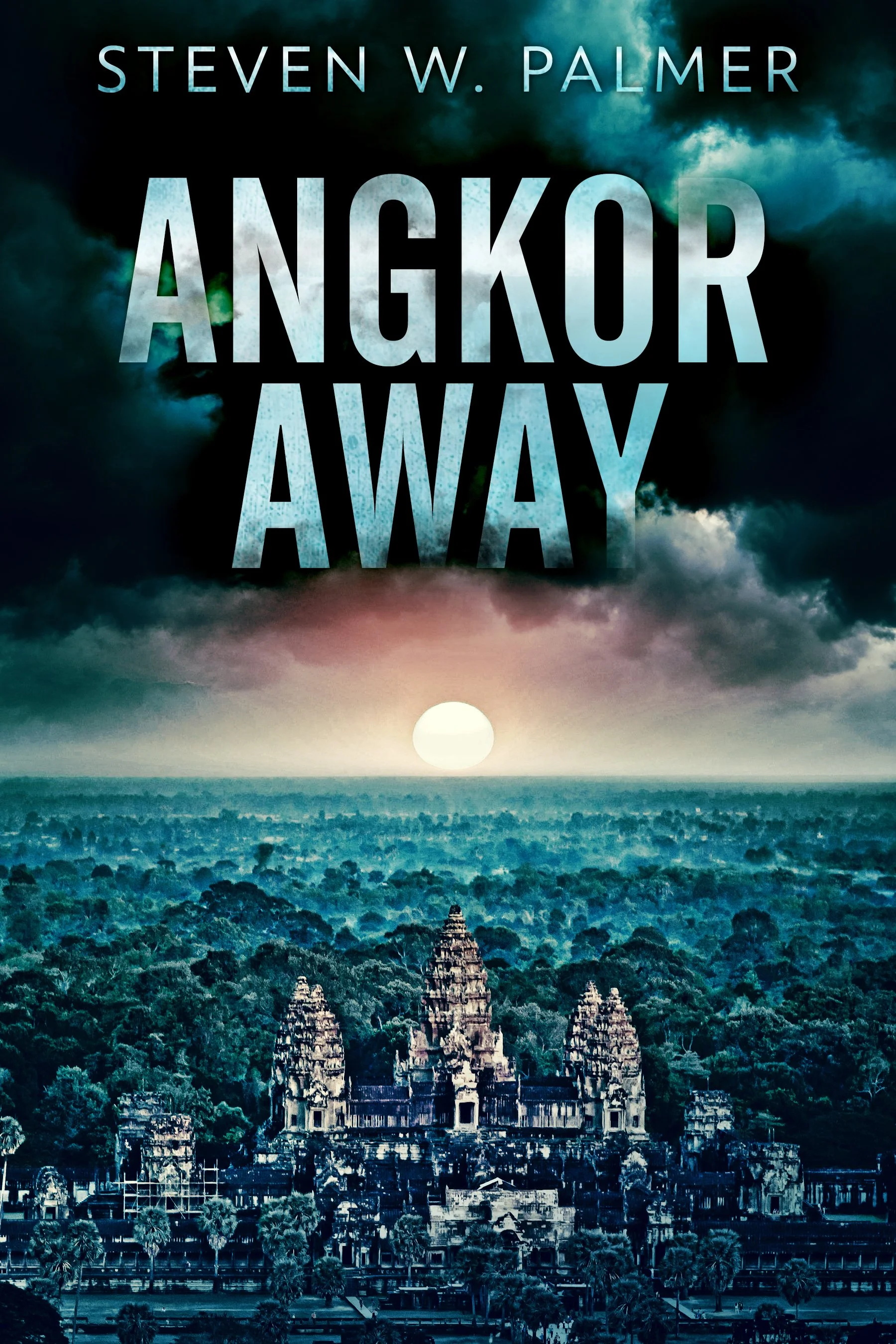Hemadri Nadi - A Glacier Too Far
Book summary
A century after two Scottish women braved the icy peaks of The Himolo, their legacy endangers the interests of a mining corporation with controversial claims on a glacier. As corruption and conspiracy unfold, a local teacher is drawn into a web of deceit linking a criminal syndicate, a religious sect, and a shadowy art collector.
HEMADRI NADI - A GLACIER TOO FAR is an environmental thriller steeped in corporate intrigue, social injustice, and historical mystery.
Excerpt from Hemadri Nadi - A Glacier Too Far
Overhead lights
This time, looking straight at the camera, shirt smoothed, smile in place, Pradesh delivered a flawless performance. Flawless in the sense, not too practised (it was), certainly not without hesitation, but enthusiastic and with conviction. Standing proudly in front of the neat, brightly coloured schoolhouse, he came across as sincere and, above all, likeable.
‘Yes, people will like you, Pradesh, they really will! They’ll listen to this and trust in what you have to say,’ affirmed Dan opposite, congratulating himself as much as his subject. Squinting, they leaned into the screen, watching the playback together. Pradesh beamed, keen to please.
Only the older more ‘serious’ pupils in full blue school uniform had been selected to appear in the footage, aged nine to eleven, strategically placed to the right of the shot, sitting in rows at small wooden desks, carefully writing out their lessons under the instruction of Mrs Kapoor aside her portable blackboard. Filming and desks had been hastily moved outdoors after the photographer had taken in the state of the crumbling classrooms.
The headteacher turned around smiling, nodding his approval.
‘Well done, children!’ And with a couple of loud handclaps announced break time.
On cue, the school doors burst open, releasing those who had not made the cut. Retrieving a couple of old footballs en route, the boys ran over to the opposite side of the schoolyard, whilst the girls scattered into small, shouty groups. The younger children were playful. But excluded from the morning’s carefully choreographed proceedings, the older ones made a point of feigning indifference as to what their friends had been up to.
Daniel Wilde had been assigned to ‘seek out an influential figure in the rural community able to deliver a short script in clear English. Neither too old, nor too young, he or she should have an honest demeanour, be preferably not unattractive and certainly likeable.’ Not the easiest of briefs, it had been a relief to come across the young, articulate schoolmaster, educated in the capital and now back to his roots, amenable to putting himself in the spotlight to promote a better future for his pupils.
Dan too liked to think he was playing his part and supposed the client was well-intentioned – although, in truth, it mattered more that they paid well, helping to plug the hole in his travel fund. This was the third awareness-raising shoot he had done for them. The first with a quarrelsome elderly couple of vegetable growers on their pea and potato terraces, the wife so stooped she could barely look up into the camera. Then with a twitchy grocery store owner who talked in jolts and kept tripping up over his words; more articulate speech would need to be synched if condescending subtitles were to be avoided, regretted the photographer.
Packing up his gear, he paused to inhale his surroundings. Tunga Primary School was based in a small, picturesque hill station, one of many tucked in the contours two thousand metres above the Himolo plains, whose farming communities had been spared the lingering pandemic restrictions further south. A plume of smoke drifted upwards from one of the houses. He detected a blend of other earthy scents he couldn’t place. Clean air (woodsmoke did not count), clear light, open space. A change from the random smoggy assignments he had been picking up across the border in the Indian cities.
Dan closed his eyes. Right arm raised, bent at the elbow, fingers pinched together as if holding a dart, he took aim and flicked open his hand, firing his imagination into the landscape opposite, repeating the action at a different angle. He opened his eyes and laughed, fancying it was his work. Scattered below the sloping coniferous forests were rectangles of colour; red, green and blue façades, rows of yellow roofs, clusters of orange shutters. Other smaller splashes of colour were also dotted all over the hillsides. Human flecks. Two watching children giggled before running off to tell the others about the strange foreigner.
‘That was me just now, I painted those houses,’ shouted Dan after them, knowing they would not understand, but happy to give them reason to turn their heads round, raise their hands to their mouths and snicker even harder.
The children saw far fewer white faces over this side in the West Highlands. Most tourists were bussed right at the main intersection an hour above the valley floor, towards the more developed towns and hill stations to the east. For some as far as they would go. Others had their sights set on a far peak behind the towering walls of rock to the north.
The photographer, meanwhile, on his hired moped, had turned left at the intersection below, sharing the narrow, rutted road over the next two hours with mostly local traffic. Lopsided, over-laden small trucks with parts hanging off, swirling in dust and black fumes. He didn’t know why they honked at him, but they did. Frequently. Especially when stopped at traffic lights on sections of road under repair. His bike seemed fine, so he just smiled, waved and honked back. Ah! He remembered the faded Union Jack sticker on the back of his rucksack. Perhaps a nod to The Queen, front page news having just lost her loyal duke, aged ninety-nine. Or something like that…
The schoolteacher had written down the address of a homestay close by belonging to a cousin. (Over there, he had pointed with the confidence of a local. But over where exactly, Dan couldn’t say). He planned to go hiking. Shoot some more material. Seek out the famous rhododendron forests. On the way up he had seen farmers and oxen working the land, tilling and quilting the hillsides with crops he couldn’t name, opportunistic birds flying behind, swooping on worms and seeds. It would be good to get a similar shot with prayer flags in the foreground. But no matter, they could be added in later, as could the birds.
Pradesh Sharma, on the other hand, saw everything through a less filtered lens. For him this was home in all seasons. He knew for which crops each terrace was being prepared, which patch of soil or low growth would become barley, buckwheat, legumes, potatoes, or even tea. Just as he could identify the smells coming off the land, the sounds resonating off the hillsides, the taste in the air signalling a storm to come. He could name all the peaks on the horizon, the ones behind them and then again, the glaciers, the cirques, the arrets, the cascades, the mountain passes, lakes, streams and rivers…
Unusual among his cohort, the young schoolteacher had volunteered for a rural placement after completing his three-year post-grad rotation in large urban elementary schools down south. His stint in the city, where good things might happen if only you could hold on to them, had given him a vague sense he should try to do something to shake up his own community. But two years on he had yet to make his mark. He suspected he was not a particularly good schoolteacher, and if he was going to make a difference, it was unlikely to happen in front of a whiteboard.
At home time, a mother came over quietly.
‘Here.’ She held out an envelope to him timidly. A few coins towards her daughter’s school fees. The teacher’s books never balanced, and he was not supposed to let them pay ad hoc, but for some it was the only way. This woman had a husband with a temper. Her daughter needed an education to escape. If she could make it to the end of the year, there was a slim chance of a scholarship to a boarding school beyond his reach. She brought her hands together with a tilt of the head. Wishing he could do more, he watched the two of them leave, side by side, the daughter leaning in, slightly taller than her mother.
Embarrassed, he ran his hands over the crumbling classroom walls which repelled all attempts to display the pupils’ work. Caught off-guard to see the school’s shameful state through the photographer’s eyes earlier – but there was no money to fix them. Yet, what he had said in the video gave cause for hope. A big shift was coming.
Now was the time to talk to his parents again about the future of the family business. And be prepared to stand up to his siblings: Adesh, his domineering elder brother whose agreement would likely come at a price, and his elder sister who had an opinion on everything – not always backed up by informed knowledge. Careful manoeuvring would be called for to keep Adesh in check, but Preeda, he reckoned, was too preoccupied with her midwifery practice and safeguarding her husband’s land to interfere. At least Jany, twenty-one, studying for a digital marketing degree down in Shivalaya, was already on board with ideas of her own. The youngest and smartest of them all.
The Sharma women had loud voices. Their mother had raised her daughters as she herself had been raised: to step forward out of the shadows. Their feisty attitude and lack of restraint in their early teenage years, so humiliating to Adesh, was at best startling to their peers raised in more traditional households. The younger son would melt into the background whenever a confrontation threatened.
On his aging computer with slow wifi, in the shack that passed as the school office, the teacher pulled up some numbers related to the family farm. Not great reading with the profits coming under increasing pressure from the plantations down in the plains. Over the years, his parents had bought up neighbouring patches cheaply and the orchard was one of the most productive in the area, but their ten hectares of soft fruits, plums, litchi, apple, peach and experimental pomegranate was no match for the intensive lowland farms under plastic. Up here, not only were the open crops subject to the vagaries of the weather, but the growing season was far shorter.
Since they could not compete on yields, Pradesh was pushing for a change in practices: farm organically, ditch the pesticides, work the land more sustainably, appeal to a different, wealthier consumer. But in the short-term this meant exposing the farm to even greater risk. He looked up briefly from his computer, recalling all the spray they had gone through the previous year to keep the codling moth at bay. The older trees were also susceptible to brown rot and canker disease.
For his plan to work, the farm must also become a destination. He had visions of an all-year-round organic resort, attracting western tourists and prosperous Himolans and Indians from the cities. Visitors could stay over, relax, stroll through the soft fruit fields and orchards, pick-their-own. Inspired by the websites of farms in the east, he carried images in his head. A pool set in landscaped gardens for the summer months with a juice bar and outdoor lounging area shaded under a canopy of branches proffering passion fruit and figs to outstretched hands. He already had a place in mind to build a small, raised platform, a perfect vantage point showcasing the orchard with the mountains behind for guests to take photos. Birthdays! Weddings! They should definitely do weddings advised Jany.
Money of course was the problem. Without a loan they couldn’t expand, yet the banks did not favour lending to locals. But what if locals could piggyback on the backs of outsiders…? Once again his mind drifted back to that afternoon and the bait of foreign investment on an unprecedented scale.
















Praesent id libero id metus varius consectetur ac eget diam. Nulla felis nunc, consequat laoreet lacus id.